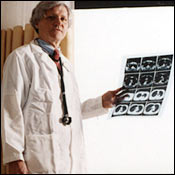
INNOVATOR: ONCOLOGY
Moez Ghermezian had already had part of his right lung removed and his left leg had been amputated below the knee. Then his lung cancer spread to his hip, leaving him in so much pain that he could barely walk. Chemotherapy and radiation didn’t work. Then last December, his doctor suggested an experimental drug called Iressa. Now the 52-year-old from Great Neck, Long Island, is walking again, and that’s just the start of the good news.
“I have no pain at all,” he says. “And if you look at my X-ray and my cat scan, the area with my cancer is completely healed.” The disease could come back at any time, of course, but he’s not thinking about that now. “Thank God,” he says. “The doctor says someone is smiling down at me.”
Ghermezian is one of tens of thousands of lung-cancer patients who have been given new hope thanks to Iressa, one of a new class of “smart drugs” known as epidermal-growth-factor receptor blockers that work by shutting off the molecular switch that allows cancer cells to grow.
Mark Kris, chief of thoracic oncology at Memorial Sloan-Kettering Cancer Center, conducted the trial for Iressa that led to the drug’s May 2003 FDA approval. As opposed to chemotherapy or radiation, Iressa doesn’t have debilitating side effects like severe nausea or fatigue, and it’s taken, once a day, in the form of a pill. The drug is approved for use in patients who have failed to respond to other treatments for non-small-cell lung cancer, the most common form of the disease and the leading cause of cancer deaths (120,000 a year) in the United States. In trials led by Kris and others, one in ten people who took Iressa had shrunken tumors, and many found they could breathe easier and return to normal life, at least for a few months.
Iressa isn’t a cure, and it has dangers of its own (about 1 percent of patients develop potentially life-threatening additional lung diseases). But for lung-cancer patients with few other options, the risks are often worthwhile, and even a small improvement in their condition can be meaningful (just 10 percent of patients diagnosed with lung cancer survive more than five years).
What’s more, researchers at Sloan-Kettering and elsewhere recently found that patients who respond best to Iressa have a certain genetic mutation—a finding that could pave the way for a new generation of cancer drugs tailored to the specific genetics of a patient’s tumor. “This is a concept drug,” says Kris. “It’ll help us chip away at the disease until we have something that works for the whole population.”